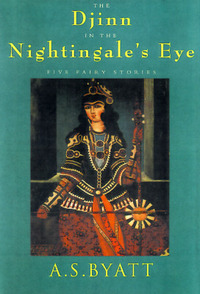Take a photo of a barcode or cover
The first two stories in this collection originally appeared as part of Possession, but it's been more than 20 years since I read that, so they felt new to me: fresh takes on the fairytale genre. The next two stories were commissioned for other purposes and also offer smart feminist takes on the genre before the centrepiece of this collection: the title-story which is more of a novella. It's a magnificent postmodern take on the Arabian Nights with lots of meta-commentary on the nature of stories and the role of fate, with Byatt again using the academic world as a tool in this regard (as she did in Possession).
reflective
relaxing
slow-paced
Plot or Character Driven:
Plot
Strong character development:
No
Loveable characters:
Complicated
Diverse cast of characters:
Yes
Flaws of characters a main focus:
Yes
A. S. Byatt is plain and simple, just a great writer. She can make fairytales come to life and even the ones I didn't care for were interesting enough to keep me reading.
These were fun stories to read, but I abandoned this and returned it to the library a few pages into the large title story which was inexplicably abominably boring. Knocked a star off for that.
adventurous
mysterious
medium-paced
I read this book as part of the required material for a university module roughly ten years ago and kept it around for some reason.
Needless to say, my opinions on the stories have drastically changed since then. The only exception being The Eldest Princess which is the standout among the other stories and mostly holds up.
The titular story itself has aged pretty badly, exoticising Middle Eastern cultures and its people. Some notable examples being:
Needless to say, my opinions on the stories have drastically changed since then. The only exception being The Eldest Princess which is the standout among the other stories and mostly holds up.
The titular story itself has aged pretty badly, exoticising Middle Eastern cultures and its people. Some notable examples being:
- The main character's fixation on a trio of hijabi women in the audience and some soldiers taking notes in the background of one of her lectures. It seems in Byatt's infinite wisdom, someone neglected to tell her that several principles of science and mathematics still in use today originated from Arabic countries.
- Byatt vaguely likening the Wishing Column in the Hagia Sophia to a vagina for some reason. Perhaps Byatt was trying to make the women laughing at the main character's reluctance to put her hand in the whole seem enlightened about their bodies and sexuality, but it fell flat and the vagina comparison was on the same level as schoolboys drawing penises on their peers' chairs.
- Byatt choosing to describe the tour guide who conveyed the Epic of Gilgamesh to her as having yellow skin. Djinn or not, it's still orientalist.
There is a semblance of a story hidden in there, but the execution is overall lacking and needlessly long-winded. I suppose if you want an insight into what feminism was like at the time of this book's publishing and how we've progressed since, it's a solid read.
Minor: Sexual content
adventurous
mysterious
reflective
medium-paced
Plot or Character Driven:
A mix
Strong character development:
Complicated
Loveable characters:
Yes
Diverse cast of characters:
Yes
Flaws of characters a main focus:
Yes
This is a collection of 6 beautifull written fairy tales for adults by the author of "Possession". Its the perfect book to curl up with on a windy winter's day.
adventurous
mysterious
medium-paced
Plot or Character Driven:
Plot
Strong character development:
No
Loveable characters:
N/A
Diverse cast of characters:
N/A
Flaws of characters a main focus:
N/A
The writing is so pretentious it’s unbearable. The author uses “and” every other word. Sentences are super long for no reason, starting a new sentence wouldn’t hurt anyone. I did enjoy two of the short stories (The Story of the Eldest Princess and Dragon’s Breath) but the other ones were forgettable. I picked up this collection because of its titular story “The Djinn in the Nightingale’s Eye” but was left disappointed. Gillian was just an annoying character (dare I say it’s a self-insert?). Her fixation on the Turkish women wearing hijabs gives off major white feminist vibes which I sort of expected from the author. There was a lot of Orientalism and fetishization going on so beware. I do enjoy her use of fairytales and other texts in her narrative to comment on the act of storytelling itself. Might revisit this book and finish it one day when I have more energy.
lighthearted
relaxing
sad
slow-paced
Plot or Character Driven:
Character
Strong character development:
Complicated
Loveable characters:
Yes
Diverse cast of characters:
Yes
Flaws of characters a main focus:
Complicated
Once the Djinn enters the story it becomes a five stars, but that's a long way into it and I cannot in good faith give it that rating even if I Iove it since then.





